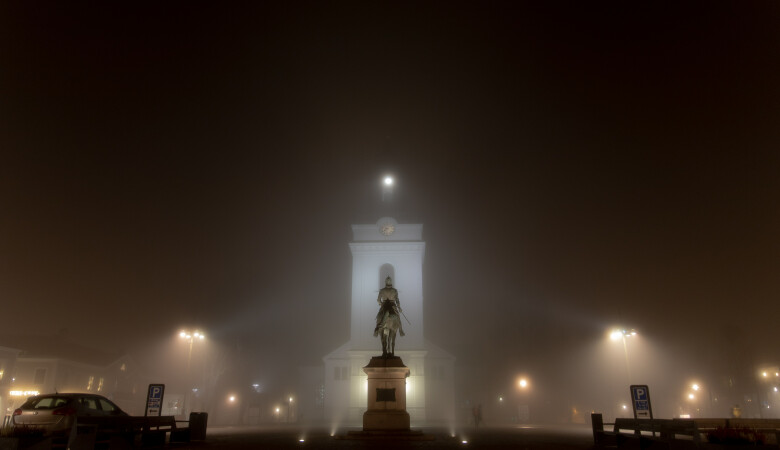Maintaining Sweet Fellowship over Disputable Matters, Part 2 (Romans Sermon 104 of 120)
June 18, 2006 | Andy Davis
Romans 14:5-12
The Law of God, Christian Freedom, Works of the Flesh, Conscience
Two Different Men, Two Different Views of Sunday
Turn in your Bibles to Romans chapter 14. We continue our study in Romans, we're looking at Romans 14, specifically focusing this morning on verses 5-12.
On July 11, 1924, Eric Liddell, took his place at the starting line of the 400 meter race in the Paris Olympic Games, and in his pocket was a note, a handwritten note that had been sent him by the team trainer, on which it was written, "In the old book, it says 'he who honors me I will honor.'" The reason that that note was written and handed to Eric Liddell is that he, Liddell, faithful to his Christian commitment and strict Sabbatarianism, had refused to run in the 100 meter heat the previous Sunday, much to the great chagrin of his nation, who were hungry for a gold medal in the 100 meters, especially against the Americans. They wanted to see Eric Liddell win and he was the best they had, and they did not understand what they considered to be his religious fanaticism.
But the scripture in his pocket said, "He who honors me I will honor," and it seems that the Lord did honor his refusal to violate his conscience, because he ran a race he was not very familiar with, that he hadn't run very often, that he had not trained for and he set the world record by two tenths of a second, winning the gold medal. And so he felt very clearly the hand of God's blessing on his commitment.
By contrast, on January 30th of the year 2000, Kurt Warner, the quarterback of the St. Louis Rams, led his team to victory in the Super Bowl, Super Bowl 34, set a record for passing yardage, the very exciting game, a rarity for the Super Bowl, and then at the very end, he led his team in a final drive 73 yard touchdown pass with less than two minutes to go. And I will never forget the post-game interview. In my opinion it's the best Christian testimony that's ever been given by an athlete in a situation like that in front of a live TV audience of perhaps 50 million people or more. The interviewer began by saying this, "First things first, Kurt, tell us about that final touchdown pass." And he shook his head, he said, "First things first, I have to give praise and glory and honor to my Lord and Savior Jesus Christ." And as he stood up on the podium to receive the Super Bowl trophy, he held it aloud and said, "All glory to God," in front of the whole world, a clear, unashamed bold witness for Jesus Christ by name, and for the glory of God. He recognized that the accolades of athletic success were soon to be gone like the morning mist, but he desired to live openly for the glory of God.
Two different men, two different eras, two different athletes, each of whom desired to use their athletic success to glorify God, but clearly two different convictions on the propriety of being involved in sporting events on Sunday. It'd be interesting to get the two of them together and see the conversation that they would have. What would they say to each other? And I think in the spirit of Romans 14, they would have an incredibly warm and loving conversation, while they disagreed on whether it was right to compete on Sunday.
Is it possible that what would have been completely sinful for Eric Liddell, competing on Sunday because it would have violated his conscience, was completely acceptable for Kurt Warner because he did so to the glory of God? That's the question in front of us in Romans chapter 14.
I. Context: Full Acceptance Even When Disagreeing
Now, we've already seen one message, we looked at verse 1-4. The context here is maintaining sweet fellowship in the midst of disputable issues. We talked last time about the first test case, that is, are we free to eat anything at all or is our diet restricted spiritually? So you look at verse 1, "Accept him whose faith is weak without passing judgment on disputable matters." And Paul's command is that we must accept what God has accepted, and specifically accept the people that God has accepted.
We talked about the need for discernment, to tell the difference between a Christian and a non-Christian and to tell the difference between an issue that's central to our faith and those things that are more a matter of Christian liberty. And we saw that Paul gives strong words to both the weak and the strong. The strong have a tendency to despise and disdain the immaturity of the weak. The weak, for their part, have the tendency to pass condemning judgments on those who exercise more Christian liberty. And so, he urges them not to do either one, but maintain unity while they continue to talk to one another.
II. Test Case #2: Sacred Days
Today, we're going to look at the second test case that Paul brings up on this whole issue of maintaining sweet fellowship while we dispute over issues, and that is the issue of sacred days or special days. Now, there's much dispute on this verse, verse 5, also verse 6, straightforward translation talks about one who honors or esteems a day above another, just takes a day above another. The NIV puts the word "sacred" in there, one man considers one day more sacred than another. It's not strictly speaking in the text, it just means that he esteems one day above another. That's a simple translation.
The issue I think is clearly religious observance. It's the idea that this man thinks of this thing as a religious matter, a spiritual matter, that one day is spiritually more significant than another. Almost certainly, this has to do with Old Covenant regulations which would elevate one day and make it different than the others. Now, the Old Covenant had sacred days, special days, the Jews did. They had in particular three festivals that they were required by Jewish law, by the law of Moses, to observe. You had the Feast of Passover, unleavened bread, you had the Feast of Weeks, or first fruits, also called Pentecost, and then you had the Feast of Ingathering or booths, Passover, Pentecost, and then ingathering or booths, those were the three.
Furthermore, the Jews were required by the law of Moses to travel from their homes in the Promised Land, and make their way to the place that God would choose. That one place among all the tribes where they would all worship. And in the course of time, we found that that was Jerusalem, the City of David, and so they would all travel to Jerusalem. But in the Book of Deuteronomy 16:16, it says, "Three times a year all your males shall appear before the Lord your God, at the place that he will choose, the feast of unleavened bread, at the Feast of Weeks and the Feast of Booths and they shall not appear before the Lord empty-handed." Now, before the exile to Babylon and really, even more clearly, before the split, of the Northern and Southern Kingdom, the Israelites traveled joyfully and easily, from all over the Promised Land from Dan to Beersheba and they made their way up to Jerusalem. As a matter of fact, there's a whole body of Psalms called The Songs Of Ascent that they would sing, as they were making their pilgrimage three times a year.
Psalm 122:1 is a Song of Ascent and it says, "I rejoice with those who said to me, 'Let us go up to the house of the Lord.'" So they're singing these songs and they're traveling and they enjoyed that. It would be a major part of the rhythm of the year of the Jews. It would be unthinkable for a Jew not to observe Passover, to not travel up to Jerusalem and do that. Now, of course, after the exile this became much more difficult. It became much more difficult to make the pilgrimage from wherever you'd been scattered and go all the way to Jerusalem, to see this, to observe this feast, and yet there were still some Jews that did it. As a matter of fact, if you look in the Book of Acts and you see in the day of Pentecost when the Holy Spirit was poured out on the church and all of the church, those Jews that had trusted in Christ, the apostles and a small number, about 120 in the upper room.
They were gathered but it says in Acts 2:5 "Now, there were staying in Jerusalem, God-fearing Jews from every nation under heaven." So people had traveled from all around the Mediterranean and as far as they been dispersed and they had made their way up to Jerusalem to observe this religious feast. They're listed in Acts 2:9-11 "Parthians, Medes and Elamites, residents of Mesopotamia, Judea and Cappadocia, Pontus in Asia, Phrygia and Pamphylia, Egypt and the parts of Libya near Cyrene. Visitors from Rome, both Jews and converts to Judaism."
Now that's interesting. Many scholars believe that was the beginning of the church at Rome the day of Pentecost, as visitors from Rome heard the Gospel preached by Peter filled with the Spirit. They came to faith in Christ and then went back to their home in Rome, and they started the church, and they were both Jews and converts of Judaism a mixed church there and that's how it began. And so we see the concern for spiritual days. It's right there written in the Old Covenant, the festivals and most scholars agree that at least it means this: It has to do with these religious festivals that the Jews, observed. Now in the New Covenant, the Lord has been very clear that these ceremonial days, these ceremonial observances have been fulfilled, they're no longer binding on the Christian these thrice annual feast at least pointed to Christ's work on the cross so beautifully. Don't they? How Passover, the blood of the lamb, shed so that the angel of death passed over has been fulfilled as Jesus died at Passover, and then the feast of weeks, Pentecost happened at the first fruit when the first fruits were gathered in they would go celebrate and you can see how spiritually these 3000 that were added to their number were like first fruits of the Gospel. It's been fulfilled. The final one we're still waiting for. But that doesn't mean it's binding on us, namely the last fruits, when the last gathering has come in and the final trumpet will sound and everything will be done. But you see how they really just picture the work of Jesus Christ in working salvation.
Ceremonial Days Now Fulfilled
Now the message very clearly that Paul gives in Colossians and we'll talk about in a minute, is that these things have been fulfilled. Colossians 2:16 and 17 says, "Therefore, do not let anyone judge you by what you eat or drink, or with regard to a religious festival, a new moon celebration or a Sabbath day, these are a shadow of the things that were to come. The reality, however, is found in Christ." So what he's saying is that these feasts pointed toward Christ, they pointed toward the Gospel and now they have been fulfilled.
Christ Himself pointed to a day when they would no longer need to go to this one place Jerusalem to worship he said in John Chapter 4 to the Samaritan woman, "Woman believe me, a time is coming when you'll worship the Father neither on this mountain nor in Jerusalem, God is a spirit. And those who worship Him must worship in spirit and truth." And so he's pointing to a time when they wouldn't be required to come to Jerusalem, and worship, but they could worship anywhere because God is a spirit. Now, Paul's message here in Romans is one of freedom, but also one of conviction by the Holy Spirit. Like the eating laws the time for these has been fulfilled. It has been... It's passed by now. In Galatians, Paul is adamant that the Gentile believers there, understand their freedom in Christ, they're set free from the law, they're set free from the ceremonial regulations of circumcision and all of the ceremonies of the Law of Moses. They didn't have to do it anymore. And so in Galatians 5:1, he says, "It is for freedom that Christ has set you free, stand firm then and don't let yourself be burdened again by a yoke of slavery.
He wants them to be as free as Christ intends for them to be free and he talks about this earlier in Galatians 4:9-11, he says "Now that you know God or rather have been known by God. How is it that you're turning back to those weak and miserable principles? Do you wish to be enslaved by them all over again? You're observing special days and months and seasons and years. I fear for you that somehow I've wasted my efforts on you."
So he's actually very strong about this observation of special days. He says that shows you don't understand the Gospel. So that's a big concern. There it would have been wrong for them to continue to observe these special days because it showed they're acting like slaves, and not like sons and daughters of God. The time for ceremonial requirements is over. But then the question is, "Can somebody still observe them, is that okay? Can we choose to do it even though we know we don't have to do it, can we choose to do it? Can we can still keep the old feast?" Well, Paul would say, Yes, as long as you understand the covenant of grace and how we're saved by the work of Jesus Christ on the cross and not by this legal observance, we learn from the book of Hebrews that the time that you can observe it is coming to an end soon anyway, they were in a transition period as I mentioned last time, in which you could still go to the temple, you could still observe these feasts and these festivals but it wouldn't be long before the Romans would put an end to that by destroying the temple.
What About the Sabbath?
Now we come to the real question of this text, and that is, is Paul talking about the Sabbath is he talking about the Sabbath the Sabbath observance? Many Christian groups like Eric Liddell's have considered themselves strict Sabbatarians. So I actually looked up and found how orthodox Jews living in Jerusalem today, keep the sabbath regulation, and I found that there's nobody that comes close to them.
If you want strict Sabbatarianism just find out what the Orthodox Jews are doing in Jerusalem and see if that's how you'd like to live. Listen to this description according to a 1987 Associated Press story this is how orthodox ultra-Orthodox Jews observe the Sabbath. In Jerusalem before the Jerusalem Sabbath siren wails at sundown Friday night, marking the beginning of the Sabbath. Orthodox Jews unscrew the light bulbs in their refrigerators so as not to inadvertently turn them on and violate the Sabbath. Now in Exodus 23, you're forbidden to light a fire in your dwelling place, on the Sabbath. So they feel that if you open the refrigerator the incandescent light bulb will be lighting a fire on the Sabbath, and so they unscrew it.
They turn off their water heaters. That would include all heaters, like middle of the winter, everything any fire, it's out, they hide money because it's a reminder of daily labor instead of divine rest. They cut their toilet paper in advance because ripping it would violate a Sabbath regulation, so they cut it out in certain measured amounts they light tall white candles moments before the sun down, so it's... Timing's everything so they don't want to waste too much of the candle, so they wait moments before the siren because you're not allowed to light the match, but once it's lit it can keep on burning. You see, once the Sabbath has begun.
These are some of the acts prohibited during the Sabbath. Taking a bath, opening an umbrella touching a pen. Because they feel writing is work. Strict but complicated carrying laws govern what objects may be lifted and how far they may be moved. Doesn't that sound like John 5, where Jesus healed a man and told them to pick up his mat, and go home, and the Sabbath police came and got him on mat carrying. He's a mat carrier. Well, I'm healed 40 years I've been... Oh you're mat carrier who told you to carry your mat. There's this whole attitude the Sabbath police. And so they... Even today the ultra-Orthodox Jews, have rules on what you can carry and how far.
Much of the Sabbath, is spent in three long ritual meals usually shared with friends who arrive on foot and interrupted frequently by blessings and ancient Hebrew songs. Each meal begins with bread season heavily with salt, which must everybody has to eat, to remind them of coming out of Egypt with Moses. Cooking is forbidden pre-cooked food is kept warm by turning a burner on low before the Sabbath, and covering it with a copper plate, so it's burning the whole time, but they have to ignite it before the Sabbath, starts. The whole mentality of strict Sabbath observance is not the mentality of a son or daughter of God, do you see it? And this is what this man says, Yitzhak Wexler an orthodox Jew says "the Sabbath celebration following six days of work is an inalterable contract with God. Either we keep the contract as God commands or we lose the Jerusalem, he gave us." Do you see the fear in that? That God's going to, He's going to destroy us, if we don't keep this. It's the mentality of a slave or of a contract worker.
Is Paul Even Talking About the Sabbath?
Now the key point of disagreement for Christians however, as we come to Romans 14 is, is Paul even talking about the Sabbath? Notice that the word Sabbath is never mentioned here. It doesn't come up, it just says one man considers one day more sacred than another, another man considers every day alike, so word Sabbath doesn't even show up. If Paul is referring to the Sabbath in my opinion, it ends Sabbatarianism forever. But he doesn't openly say it so we're still open to discussion that's how it works. And so Christian commentators are divided on this. John Murray who is Sabbatarian, put it this way,
[If Paul is referring to the Sabbath in Romans 14:5], "this would mean the Sabbath regulation in the 10 Commandments does not continue to have any binding obligation upon believers in the New Testament economy. The Sabbath regulation would be no different than any of Moses' ceremonial laws. Secondly, the observance of the first day of the week, the Lord's day, would have no sacred significance either since Paul is freeing the Roman Christians from any special observances. Thirdly, the one who continued to observe a weekly Sabbath, the Lord's day would actually be seen in Romans 14 to be the weaker brother, because he had not yet attained to a fully mature view of the Lord's work of salvation. Just like the weak brother who can't eat certain foods, because of his conscience. So also the one who observes a weekly day of rest and sacred worship would seem to be weak in his faith."
And for John Murray those three things are unthinkable, and so he cannot come to the conclusion that Paul is even talking about Romans 14.
In general, Christians who have a very high view of the Sabbath, who feel that Christians, should be strict and dedicated to setting apart one day in seven, as holy to the Lord, who feel that it's a great sin not to do so, would utterly reject any idea that Romans 14 is talking about the Sabbath. But I believe that Romans 14 is talking about the Sabbath. And I think it's important, we could talk for hours and hours about this issue, the issue of the Sabbath and how Christians are to observe. And I have a number of things that I want to say, but I don't want to do them. What I want to do is get you to look at two passages in particular, take your Bibles and look at Colossians 2, which I've already alluded to, but for me, it's probably one of the most significant verses on this whole issue. Colossians 2:16-17.
Colossians 2: 16, 17 says this, "Therefore do not let anyone judge you by what you eat or drink, or with regard to a religious festival, a New Moon celebration or a Sabbath day, these including the Sabbath day are a shadow of the things that were to come. The reality, however, is found in Christ." To me, that's a very strong verse on this issue very strong. First of all, I want you to notice that it's very hard to obey Paul's injunction here. Look what he says in 2:16, "Do not let anyone judge you by what you do on a Sabbath day." Well, I don't know how you're going to pull that off, okay? I think perhaps what it means is don't take it to heart if they do and try to persuade them not to based on Romans 14. That's what I get out of it. Other than that, they're going to go ahead and judge. But in effect, he's saying, "Don't let it concern you." They are not the one who's going to be sitting over you on judgment day, so don't take it to heart, and certainly don't do it yourself."
But even more significant to me is the idea that these things, the Sabbath in particular, is a shadow. The reality is found in Christ. This is the exact language used in the Book of Hebrews to talk about all of the ceremonial law. Shadow - Reality. Shadow is Old Covenant, reality is found in Christ. The second passage, I want you to look at is Hebrews Four. So turn your Bible's to Hebrews 4:1. "Therefore since the promise of entering His rest still stands, let us be careful that none of you be found to have fallen short of it." There he's talking about the fact that the Jews refused through unbelief to enter the promised land. They refused to enter in, they were afraid in the time of Moses, and they turned back, and for 40 years, they had to wander in the desert because of their unbelief. You remember that terrible, terrible story. And what the author is doing is, what happened there, picturesquely in the Old Covenant. Now, it's a very serious issue concerning the New Covenant. If you refuse to enter into the rest of the new covenant, by believing in Jesus. If you refuse to come in to the rest of Christ's salvation you'll be destroyed just as they were. So it's a very serious thing he's saying here, "For we also have had the Gospel preach to us. Just that they did, but the message they heard was of no value to them, because those who heard did not combine it with faith."
Now look at verse 3, "Now we who have believed enter that rest, just as God has said, 'So I declared on oath in my anger. "They shall never enter my rest."'" He's saying by faith, we enter the rest that he has in mind and that rest is salvation clearly, because he's talking about the gospel. "'So I declared on oath in my anger. "They shall never enter my rest."' And yet His work has been finished since the creation of the world. For some where God has spoken about the seventh day in these words, 'and on the seventh day God rested from all his work,' and again, in the passage above, he says, 'They shall never enter my rest.' It still remains that some will enter that rest, and that those who formerly had the Gospel preached to them did not go in because of their disobedience. Therefore, God again set a certain day calling it 'today.' When a long time later, He spoke through David as was said before, 'Today, if you hear His voice, do not harden your hearts.'" Now, let me stop there and say The most important day of the week, is always the same. It's today. That is the spirit of Romans 14, in my opinion. Today and today and today do you understand our whole lives are woven together by a series of today's.
And you can enter your Sabbath rest, today, whether today's a Sunday or a Wednesday or a Friday, it doesn't matter, it's the day that God calls you through faith in Christ, the day that you believe the Gospel, you will enter your rest. That's the vital day of the Christian life. It's today. Now today happens to be a Sunday and therefore for me this is the most important day of the week, right now today, because I can't do anything about yesterday and I can't really do anything about tomorrow except affect it by decisions I make today. But today, today is the day I must obey, I must follow. For if Joshua verse eight had given them rest, God would not have spoken later about another day, "There remains then a Sabbath rest for the people of God. For anyone who enters God's rest, also rests from his own work, just as God did rest from his. Let us therefore make every effort to enter that rest so that no one will fall by following their example of disobedience." What rest is, he encouraging them to enter. Its salvation through faith in Christ.
As Jesus said in Matthew 11, "Come to me all you who are weary and burdened and I will give you what, I'll give you rest. Take My yoke upon you and learn from me for I am gentle and humble in heart. And you will find rest for your souls for my yoke is easy and my burden is light." Jesus is inviting any of you are hearing me today to enter the true final Sabbath rest, faith in Jesus Christ. And when you do, you will in some mysterious and spiritual way rest from your labors. And now Jesus says, "My Father is always at His work." So yeah, there's still works to be done, but your soul is at rest, in Christ, He's come to your home." To me, I think Colossians 2 says that the Old Testament Sabbath was just a shadow the reality is, Christ. Hebrews 4 explains the theology of the Sabbath and what it was meant for. Now we could go on and on and debate if we had an open forum. You could say "Yes but, it's right there in the 10 commandments written by the finger of God and so it is", and therefore I respect anybody who says, "I believe this is a lasting timeless commandment for all people, all cultures, all times because it's in the 10 Commandments. I respect that this is not an easy issue. And clearly, Paul doesn't say one thing one way or the other, he says, Whatever you believe be certain about it in your own convictions, and act according to your own convictions.
III. Paul’s Command Concerning Ourselves: Live for the Lord Alone
And so, Paul gives a command, concerning ourselves we should live for ourselves alone. Look at verse 5, go back please, to Romans 14 and look at Verse 5. "One man considers one day more sacred than another. Another man considers every day alike. Each one should be fully convinced in his own mind." The act of setting aside a special day for spiritual purposes should be between you and God. It's something you decided to do to please God and to honor Him. You must be completely persuaded in your own mind that this is what God wants you to do. If your conscience is bothering you, you're not acting in faith. And we'll find out later in Romans 14, that whenever you do not act by faith, you're in sin. Look at verse 23, it says there, "The man who has doubts is condemned if he eats because his eating does not come from faith and everything that does not come from faith is sin." So whatever you believe about the Sabbath be completely convinced in your own mind, and then act according to your conscience, act according to your commitment, act by faith. If you believe the Sabbath regulation is still binding on the conscience of a Christian and if you violate that, for you, it is sin.
Secondly, not just be fully convinced, but you need to live for the Lord. Look at verse 6-8, "He regards one day as special does, so the Lord. He who eats meat, eats to the Lord, for gives thanks to God, and he who abstains does so the Lord and gives thanks to God. For none of us lives to himself alone and none of us dies to himself alone. If we live, we live to the Lord and if we die we die to the Lord, so whether we live or die, we belong to the Lord." Paul's call here is to live a life directly to the Lord. Live a life directly to Christ directly in His face, in His eyes, to please Him, directly to Him. This is a far more powerful compulsion than any legal requirement ever was. Christ has redeemed us from the law and He has called us up into a higher relationship with Him, not as slaves following rules, but his sons and daughters following relationship. It's a higher way to live, because we're not under law but under grace. Therefore regarding one day as sacred is perfectly fine. Beneficial even. If you want to do all you're cooking on Saturday night, so you can have more time for rest and worship on Sunday, fine. If you want to abstain from watching spectator sports on Sunday, so that you can concentrate on prayer and Bible reading that's great.
If you desire to abstain from going to restaurants or any businesses on Sunday, fine. But if you're doing so out of guilt, rather than by faith, you're sinning. And if you're forcefully persuading others to do the same or judging people who don't do what you do, you're sinning. Now, that doesn't mean we can't talk about it. Tell me what you think? What do you think about making the Sabbath a delight? There's a book out there talking about that very thing, picking up on The Book of Isaiah, talking about making the Sabbath a delight, and it's got some wonderful things about the way to enrich a Sunday fellowship enrich time and be spiritual.
But what is removed is that ultra orthodox legal feeling that if we don't do this, we're going to get condemned by God Almighty. That's thinking like a slave, and brothers and sisters, we have been redeemed from that, we're out from under the law by the blood of Christ. Part of that is the danger of people pleasing, isn't it? Living your life in front of an audience of human beings, thinking What will they think, What will the neighbors think spiritually if I do this or that. It's so easy to begin to live a life to please others. We know that we're constantly being observed. Constantly judged, constantly assessed. It's easy to slip into a pattern of caring more about what others think about your decisions, then you do what the Lord thinks. Paul wants us to live and die for the Lord here.
IV. Paul’s Command Concerning Others: Let the Lord Alone Judge
Paul also gives us a command concerning others, and that is let the Lord alone judge. Christ has earned the right to judge, He has earned the right of being Lord and judge of the conscience. Look at verse 9, "For this very reason, Christ died and returned to life, so that He might be the lord of both the dead and the living." Christ died on the cross. Did you? Christ was raised from the dead, were you? Do you have the right to stand over someone else's conscience as Lord of Heaven and Earth, as Lord of the living and the dead and make an assessment of their conscience. This is the strong language that Paul is using here. Christ died that He might be the lord of the conscience, He earned that right, His title is clear, Lord of all. He rules over the whole universe. "All authority in Heaven and Earth has been given to me," said Jesus. And He won this right to claim allegiance over the hearts of His people.
And this is especially true when it comes to judging. This is Christ's special glory, He said in John chapter 5, "Moreover, the father judges no one, but Has entrusted all judgment to the Son, that all may honor the Son, even as they honor the Father." And then later in John 5, He says, "The Father has given Christ authority to judge because He is the son of man." Therefore a true Christian life is lived moment by moment in realization, of Christ's authority and moment by moment in a desire to please him. Human judges, therefore show arrogance, when they judge other people's consciences. They're taking a place that isn't theirs, that they haven't earned. Because Jesus said, "When the son of man comes in all his glory, and all the holy angels with Him, He will sit on His throne in Heavenly glory, and all the nations will be gathered before Him and He will separate the people one from another as a shepherd separates the sheep from the goats.
That is His unique glory and His unique right, what right therefore, do we have to judge our brother or look down on him? Look at verse 4, "Who are you to judge someone else's servant? To his own master he stands or falls." And then in Verse 10, "You then why do you judge your brother. Or why do you look down on your brother for we will all stand before God's judgment seat." Therefore, Christians judging others on disputable matters of the conscience are really taking an arrogant role.
V. Christ’s Exalted Role: Lord and Judge of Heaven and Earth
Christ's exalted role therefore is Lord and judge of Heaven and Earth. Look at verse 11-12. "It is written 'as surely as I live, says the Lord, every knee will bow before me and every tongue will confess to God,' so then each of us will give an account of himself to God." Do you see how he introduces the quote in Isaiah? As surely as I live, says the Lord. He puts an oath on it. As surely as I live every knee will bow before me and every tongue will swear.
That's powerful. It's something that's definitely going to happen. What's so remarkable is that Paul takes that awesome monotheistic quote, ascribed to the God of Isaiah and ascribes it to Jesus in Philippians 2. "Therefore God exalted Him to the highest place and gave Him the name that is above every name, that at the name of Jesus, every knee should bow in heaven and on earth and under the earth, and every tongue confess that Jesus Christ is Lord to the glory of God, The Father." So what is your future in mind?
According to this text, Romans 14:12. We will all give an account of ourselves to God, we're going to stand before Him and He will separate us from the unbelievers, as a shepherd separates the sheep from the goats. And is that the end of the assessment? No. You're going to give an account for everything that you have done in the body. 2 Corinthians 5-10, says, "We must all appear before the judgment seat of Christ, that each one may receive what is due him for the things done in the body, whether good or bad." So yes, we're free from condemnation by the blood of Jesus, but we're not free from stewardship accountability. We will give an account and here in we find our protection from both legalism and license. From legalism, in that none of us has the right to be the judge. Jesus alone is the judge. But from license, because I know, let me just speak for myself, I know I will have to give an account to Christ for every decision I make in this world. And therefore I must do it as the Holy Spirit leads my own conscience to His glory. I must do it, verse 23, All by faith that He will be pleased with me.
VI. Application
What application can we take from this? Well, first stop judging others. And you say, "No, wait, I don't do that, that's a problem other people have." Well, if we don't do that, then why are there so many verses about this phenomenon? I have found myself judging people, I found myself judging other drivers. I have. And found myself doing the very same thing they were doing within a week. Sometimes within the hour. We just judge people because there's pride inside us. And we wanna put ourselves above and say, "Well I wouldn't do that on a Sunday. Look at that man he's mowing his lawn." You don't even know the man's name. But he's mowing his lawn on the Sunday, and therefore he's got to be x, y, and z. We do it. Stop judging. You don't know him, you don't know his situation.
Secondly, can I urge you to just do some research and determine biblically, what you believe about the Sabbath? I've given you my case, my conscience is clear in this. Colossians 2 and Hebrews 4 settles the matter for me. I believe the Sabbath rest has been fulfilled through faith in Jesus Christ. I think there are other verses that dictate what I do on a Sunday. I believe we must assemble together. We must not forsake the assembling of ourselves together. Hebrews 10:24-25. And so I want to be with all of you. We'll talk about that more in a minute. But you need to find out what you believe about the 10 Commandments about the fourth commandment in particular, how you're going to carry so that you will not violate your own conscience only you can do that research for yourself. Whatever you believe you work it out between yourself and God that's what the text tells you to do.
The third, may I make an appeal to you, to assess the benefits of some Sabbath rest, a regular disciplined consistent Sabbath rest. Let me make an analogy. We are not required anywhere in the New Testament to fast, but fasting is beneficial spiritually. Let me make another parallel. All foods are clean, but I would not advise eating a whole big bowl of pork fat. I mean, you can do it if you want, but I wouldn't do it, I wouldn't advise it. It has no spiritual impact on you, but it might have all kinds of physical impacts, and I believe so also does working for 63 consecutive days. We're not machines. And I think the Lord in His wisdom, has given us a rhythm of work and rest of work and rest that we need to still honor. Don't be arrogant and think you don't need to rest in the Lord, and that's physically. Now let me speak spiritually. We tend to forget the word of God. We tend to forget what life is about and so it's beneficial to hear good preaching and to be with brothers and sisters in Christ and to receive the benefits of the spiritual gifts. It's beneficial. Do you think you can get along without it? You think you don't need the Body of Christ ministering to you? You need it.
So physically and spiritually it is wise to have one day in seven set apart for God. And then practically speaking, it's good to know what day it is. Imagine if we were on a shifting kind of calendar constantly moving. Alright, when is it this week? Well, it's Tuesday. I didn't get the news. And imagine if you are traveling. And so God in His Providence has arranged this first day of the week, based on some verses in the New Testament, but all over the world, Christians have, for the most part, accepted the first day of the week, and as the Sabbath looked back at the old creation, completed by God, the first day of the week looks ahead to the new creation that Christ began and inaugurated when He was raised from the dead. And so we celebrate on the Lord's day and look ahead to what He has yet to do.
And so, the Sabbath has changed on the first day of the week. That's when we get together. Freed from meticulous questions about whether or not starting a car consists in lighting a fire on the Sabbath. Had you like to work that one out? It's a long walk to church friends. Very long, and you're probably violating the Sabbath day journey thing there. We're all going to be living right around here, in an enclave or else we're going to say the lighting the fire thing on the Sabbath was fulfilled in Christ. And I can drive to church and it's okay. More than anything we'll be freed from that feeling of defilement that comes when you break a law or a rule. Instead, we're free. We're sons and daughters of God. Fourthly, live every moment for the Lord, the issue of the Sunday Ball Game or The Sunday lawn mowing begins to fade into a deeper question. How can I live every moment for the Lord who gave His life for me?
How can I make the most of every opportunity? Is a four-hour football game the best investment of my time on Friday or Saturday never mind on Sunday? Sometimes the answer may be yes for a brother or sister in Christ, the Lord will give you this desire and fulfill it. Sometimes the answer will be no, the Lord will give you another desire a higher desire and fulfill that. The mentality Paul is giving here is to learn how to live every moment and make every decision concerning what would most please the Lord, who died for me, and rose for me, and who will assess my whole life. Not if I break this rule, he'll punish me.
I want to close with an illustration that I think, I hope will be helpful to you concerning this whole question. Imagine a young family. Tomorrow's mommy's birthday. Father takes the little child aside and says, "Now, you know, tomorrow's mommy's birthday. And she loves it when you draw pictures for her, pictures with the meadows and the trees and the horses and stuff. She really loves your pictures. Now here's all the paper you need, here's all the crayons you need. Make her a picture, do something to make her happy." And you just give the child the freedom to create. But then the child wastes his time watching Veggie Tales videos and playing computer games.
The next day comes and the child has nothing to give and starts to cry. Now, what's the mommy going to do. Is the mommy going to kick the child out of the family for not having made the card? Should the family enact a law about card-making for birthdays? No, the mommy's probably going to take the crying child and hold the child and talk to the child but then at some later point, talk to that little child, about wise choices and about love. And I think in the same way, what are you going to do with today? You're going to present it to God, what's going to be on it, how are you going to use it? Today and today and today, how are you going to present it to Him? Are you going to cry over wasted time. Or you're going to give glory and honor to God by choosing what honors Him the most because you want to, because you yearn to, not because some law forces you. Close with me in prayer.






























